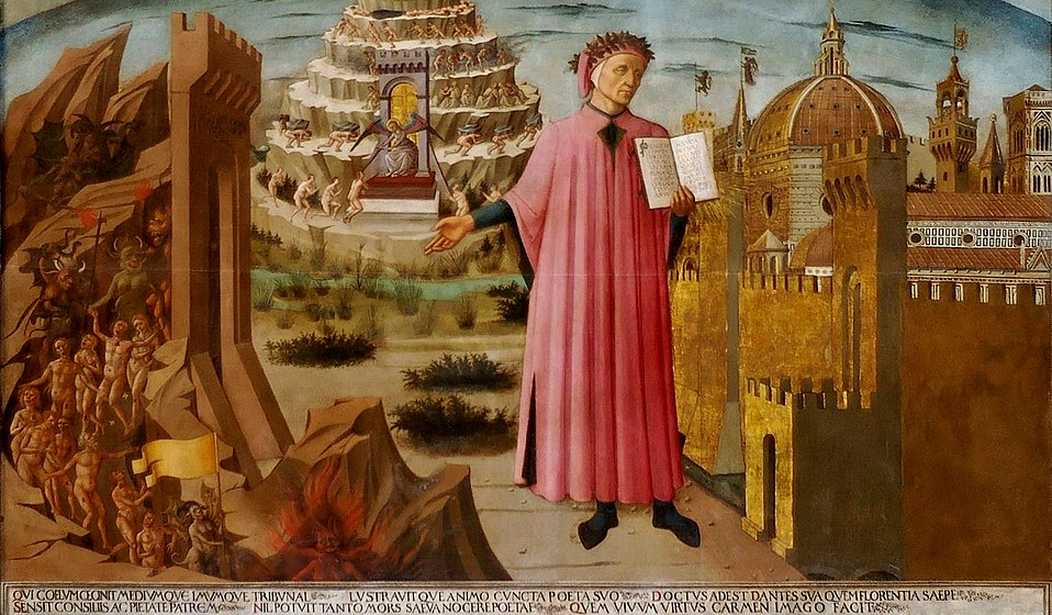In Dante’s “Divine Comedy,” according to a feature published Thursday in the British Catholic weekly The Tablet, “the Prophet Muhammad, along with four popes, is pictured suffering the torments of Hell.” However, as far as The Tablet is concerned, the big news in this 700-year-old literary masterpiece is not that, but a “less well-known” aspect of the epic poem: “how much Dante’s masterpiece owes to the vibrant culture of early medieval Islam.” Well, of course. All over what used to be known as Christendom, the best and the brightest are eagerly twisting themselves into all sorts of knots in order to argue that Islam has always been a part of the West, and not as a historic adversary, either, but as an integral element of Western culture. Why shouldn’t The Tablet join the party?
“It might seem strange,” writes English author Ian Thomson in The Tablet, “that the poem most emblematic of medieval Christian Europe, The Divine Comedy, should contain so many Arabic loan-words (‘assassin’, ‘alchemy’, ‘zenith’, ‘alcohol’) as well as references to Islamic intellectual life.” Well, no, Ian, it’s not really strange at all. The idea that one may influence and be influenced by an adversary was taken for granted in earlier, saner ages. The modern-day idea that Europe was a racist entity saturated with “Islamophobia” is anachronistic in more ways than there is space to chronicle here. But the arguable influences that may have come to Dante from the Islamic world don’t mean that jihadis weren’t threatening to conquer and enslave Europe, either.
“Eastern treatises on medicine, natural science and mathematics entered the Italian peninsula chiefly by way of Muslim Spain and Sicily,” Thomson continues, “and their fingerprints are all over this masterwork by Dante Alighieri, whose death 700 years ago we are marking this year.” Yet the picture Thomson paints is not all rosy: “In the face of Islam’s rapid westward expansion, however, Dante absorbed also a fierce dislike and incomprehension of Islam. Pointedly, the only Arabic word in his three-volume journey through Hell, Purgatory and Paradise that refers to Islam as a religion is meschite (‘mosques’). Mosques, in the Tuscan poet’s medieval Christian judgement, were a symbol of stubborn heretical allegiance and false belief. In the poem’s first volume, ‘The Inferno’, the pilgrim-poet Dante approaches the fortified Islamic citadel of Dis in Lower Hell, where gleaming red meschite of the sort seen by Crusaders in the Holy Land emerge from the charred and fatty air….”
The agenda of this Tablet article is clear. There is an all-out ongoing effort by Western “journalists” to condition Western non-Muslims to accept Islam and think of it as an integral part of the West, Islam’s 1,400-year jihad against Christendom and post-Christendom notwithstanding. Nor is The Tablet remotely the first to this particular party. Al Jazeera reported in October 2019 about “a major exhibition in London’s British Museum called Inspired by the East, that explores the significant – yet often unacknowledged – influence of Eastern culture on the West. ‘Discover centuries of art inspired by the Islamic world,’ the museum promises visitors.”
Did this exhibit explain how the Islamic influence on Western art was severely limited by the fact that Sharia forbids representation of the human form? Of course not. That would have reflected negatively upon Islam and Sharia, and so it was forbidden to be stated. Did the British Museum host an exhibition on how Western art influenced the Islamic world, a topic about which there is a great deal that could be said, ranging from the cultural appropriation of Byzantine church architecture to the stylistic similarities of Shi’ite iconography to Western art? Once again, of course not. This exhibition was just another example of the British intelligentsia’s ongoing efforts to compel Britons to be ashamed of their own culture and heritage, and to think of Islamic culture as antecedent and superior to their own. It was just more of Britain’s ongoing cultural suicide.
More of this came in August 2020, when the UK’s Guardian published a lengthy, breathlessly enthusiastic article entitled: “Looted landmarks: how Notre-Dame, Big Ben and St Mark’s were stolen from the east.” It stated: “They are beacons of western civilisation. But, says an explosive new book, the designs of Europe’s greatest buildings were plundered from the Islamic world – twin towers, rose windows, vaulted ceilings and all.” Plundered! Of course! When has the Judeo-Christian West done anything except steal, oppress, and kill?
Everywhere Westerners are being taught to hate their own culture and heritage. And this always moves in one direction only. Will The Tablet follow up its article on Islamic influences on Dante by touting some Christian influence on, say, Rumi or Omar Khayyam? Not on your life.










Join the conversation as a VIP Member